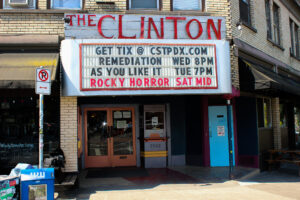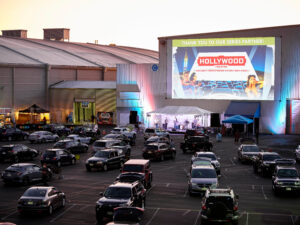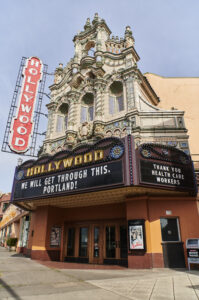
Before the great pandemic of 2020, before the movie box offices were closed, the projectors were silenced, the marquees went dark, and the popcorn machines were turned off, Portland was a cinephile’s dream. Arthouse movie theaters dominated every quarter of the city. Even better, they all served alcohol and food; the number of great microbreweries rivaled the number of theaters and they all served it up, cold on tap, along with Oregon wines & some truly great pizza (I say this as a native New Yorker).
Even more impressive than the number of theaters were the crowds that regularly attended. Kung Fu Theater at Hollywood was a once a month screening of rare, 35mm prints of Hong Kong action films from the 1970s & 80s, replete with flying guillotines, Shaolin monks, bad dubbing and lots of insane kung fu action. You had to be sure to pre-order a ticket because the 300-seat theater sold out regularly. The Clinton Street Theater screened Rocky Horror Picture show weekly since 1978 at their event “Don’t Dream It, Be It”; an interactive cabaret show with guests dressing up in costume and singing along to the sex-positive songs. It was one of the longest-running movies in the world. How do they pull it off? A passionate LGBTQ+ community that rallied around the theater and its support of their causes. If you were interested in watching the latest arthouse release, simply swing by the Northwest Film Center – as part of the Portland Art Museum, they curated an incredible lineup of the contemporary and classic film along with Q&As with the artists and creators.

Of course, all of this was pre-pandemic. Now the marquees read “Stay Safe, Wear a Mask” “To Be Continued…” or “This is Just Intermission”. “You’ll have to forgive me if I start crying because sometimes I do when I talk to people about what’s going on,” says Lani Jo Leigh through the zoom call. Six months into the global pandemic, I reached out to the independent theater owners of Portland to see how they were weathering these unprecedented times. Leigh is the Owner/Operator of the Clinton Street Theater since April 2012, after seeing an ad on Craigslist, she convinced her husband to take out a 2nd mortgage on their house to purchase the historic theater.
“I had been to the Clinton Street Theater and it was a big mess,” says Leigh. “The guy who owned it at the time had pretty much let it fall into disrepair. It was pretty divey.” Reviews of the time back up Leigh’s assessment (google them for some entertaining and acerbic comments). Her husband thought she was crazy to own a rundown theater, especially at her age (57 at the time) and because neither of them had any experience with a consumer-facing business. “I just had this belief that it [Clinton Street Theater] could be something different. There was something that just called to me. It was crazy.”
Originally, Leigh aligned her programming with her New York City defined sensibilities about cinema and culture. She showed a lot of great indie, art-house and foreign films.“No, that didn’t work out very well. Portland has a different kind of movie-going culture than what I knew back in NY,” she says. “I had to figure out what would work and what wouldn’t work and still stay within my vision of being independent.”

Leigh finally found her audience by letting her “freak flag fly”. “I just kind of dug into the things that I love about Portland and made me want to move here,” said Leigh. She started a monthly screening series called Reel Feminism; her first showing: The Red Umbrella. She brought in local sex workers as special guests to help facilitate the conversation about both the positive and the dangerous aspects of this taboo topic. Leigh also branched out beyond cinema into performing arts and music. Portland had a pent up demand for a music venue targeting kids under 21. Her theater was all ages, so she teamed up with PDX Pop Now doing live music shows with High School bands.
The key to Leighs success was allowing the community to decide the programming. All she had to do was listen. Her audience wanted a space for amateur live theater, so she collaborated with Broken Planetarium – a non-profit for amateur & aspiring theater writers, directors & actors – and the ten-minute Play festival Monkey With a Hat On.“I want people to make it be what it is,” said Leigh. “None of this is money-making. I always call myself more of a ‘steward’. I’m responsible for keeping the lights on and the bills paid.”
That has become increasingly impossible with the theater closed down because of Covid-19. Leigh received some money from a PPP loan that pays her cleaning staff but without donations from the community, it is unlikely The Clinton Street Theater will survive into 2021. She has yet to receive any substantial grants.“It kind of pulled the rug out from underneath us,” says Doug Whyte, Executive Director of Hollywood Theater, when I asked him about the effects of Covid-19. “We basically lost all of our earned revenue. It’s definitely been a challenge.”

Before the pandemic, Hollywood Theater saw remarkable growth since Doug Whyte joined the team in 2010. “It kept us really busy before the pandemic. Since I’ve started we’ve almost quadrupled the audience.” Before relocating to Portland, Whyte was no stranger to film; he started out in St. Louis where he produced documentaries, worked as a freelancer on commercial productions and even founded the International Documentary Challenge – participants had five days to make a documentary, the winner would premiere at Hot Docs in Toronto.
The Hollywood Theater has been a non-profit since 1997 and Whyte joined the board not long after arriving in Portland. At his first board meeting, the Executive Director was fired. Even though he never ran a non-profit before, Doug saw the job as an opportunity to get more involved with his community. There are not many film jobs in Portland and this allowed him to stay in the city and work in his chosen industry. He felt lucky, but the challenge was real.“It was struggling when I took it over. We had six months until we closed the doors,” says Whyte.
One of the reasons he took the job was because of the staff: Dan Halstead and Justin Harn.“They had two different sensibilities. Dan was a film collector and Film Preservationist: Kung Fu Theater, Grindhouse, 70mm. He really brought in the film crowd. Justin was more community-based. Event-based”, says Whyte. “We kind of felt like we had nothing to lose. Just sort of brainstorming how we could get more people in here. How can we bring in more voices.”
Over the last 10 years, Whyte and his team have flipped the standard model on its head. They prioritized event-based screenings instead of new runs: B-movie Bingo, Grindhouse Film Series, Kung Fu Theater. They worked with community programmers for one-off events and screenings like the Motorcycle Film Festival, Eco Film Festival, Queer Horror, Filmed By Bike (you can see a full list here). “It’s been good for business because we have so many different types of events and types of people coming through the doors.” It wasn’t an easy journey. Similar to Leigh, there was a lot of experimenting to connect with their customers. Honestly, there were a lot of things that we did that didn’t work. Thankfully we had some time to experiment and things turned around fairly quickly.”

One of the smartest innovations was their tiered membership model; starting at $5/month for the standard membership and topping off at $200/month for the supreme Cinephile Society membership, each level opens up new perks, benefits and goodies, ranging from free popcorn to exclusive pre-sale tickets (necessary if you wanted access to sold-out shows that were a regular occurrence pre-pandemic). Their members are their biggest supporters; they encourage the mission of the Hollywood Theater: to preserve film, the iconic theater and its facade (that was built in 1926 and is on the National Registry) and movie culture in Portland. Hollywood Theater recently acquired Movie Madness, the iconic video store of Portland with its 80K + archive of titles and collection of film props from movies like The Wild Bunch, Psycho and Blue Velvet. If you become a member you get access to free movie rentals and screenings at Movie Madness’ Miniplex.
“We have close to 4500 members now,” says Whyte. “It’s our main support base and it’s helping us get through this pandemic.” Their membership has actually increased since the pandemic started; they added 500 new members. While many of their existing members upgraded their status – and their monthly payment – to further support Hollywood Theater and its mission. “That’s heartening and that gives us hope.” It also helps that they own the historic building outright, so they don’t have to negotiate with a landlord who may not be so forgiving. They were also sitting on a pretty good reserve of cash. Between that and receiving some PPP funding as well as some grants, they are getting by without having to furlough their leadership team. “Everybody’s trying to reinvent what we are and who we are, for right now,” says Whyte. It was a unique challenge for a business that was built on communal theatrical experiences and physical media. “Streaming was not a thing that any of us did, or knew how to do, or were interested in,” says Doug. “We had to turn on a dime.”
Some of the challenges became a source of opportunity. A recent innovation was Movie Madness University: a film education program with classes on film history and theory. Originally intended for a max of 16 students held at Movie Madness Miniplex, they transitioned to online courses. Now they have over 100 registered students. They plan on continuing the online courses even after the pandemic is over. The Hollywood Theater has also partnered with filmmakers, studios and distributors to stream new releases in the comfort of your home – with a cut of the proceeds going to the theater. If you want some popcorn and snacks to go with your rental, simply sign up for a one-hour pickup window and grab them curbside at the theater.

If you absolutely can’t live without the theatrical experience, Hollywood Theater is open for private rentals. Bring up to 10 people and watch whatever you want on their 50-foot screen in the main auditorium. Although good luck securing a date. For now, it’s only open to members. “That’s been really successful,” says Whyte. “Every time we launch dates they sell out within the hour.” Hollywood Theater has persevered, for now, but Whyte is worried about the long term effects of Covid-19. “Some of the other theaters, I don’t know. Most of them are hanging in there but it’s tough to survive this,” says Whyte. As Whyte points out, it’s not just about any one particular theater or building. “I like the idea that there are a whole bunch of independent theaters in Portland,” he says. “It makes it a scene. I go back to St. Louis or Milwaukee, Wisconsin where I am from and it’s not a thing there.”
Of course, not every theater is as vulnerable to obliteration. 5th Avenue Cinema, located in the center of downtown, is Oregon’s only student-run theater. Owned by Portland State University, back in 1989, Mark Ruibal (the Godfather of 5th) had the foresight to convince PSU to purchase the theater that was going out of business to ensure the students would have access to film. Paid for by student fees, all showings are free to students and alumni, and it allows them to keep general admission as accessible as possible: $5 will get you a ticket and a free bag of popcorn. No complaints here. It also allows the students to program movies that typically wouldn’t be shown in big box theaters.
“Our audience is film nerds and Portland State Students,” says Madi Lou Alexander, Cinema Coordinator at 5th Avenue. Alexander is, of course, a student at PSU and became involved with 5th Ave Cinema when they started at PSU because “free movies every Friday night? I was there every weekend.” Alexander saw a job posting the previous summer and was interested to work in a place they really loved. “The regulars that come back see it as a family,” says Alexander.
The box office has been closed since the lockdowns so Alexander and the 5th Avenue Cinema team were forced to try something new. Streaming wasn’t an option since all screenings had to remain free for students. Instead, they started a podcast to keep the conversation around film alive. They use the format to talk about movies and “keep the backbone of 5th”. They are on their 17th podcast and Madi Lou admits, “it’s been a learning curve. We are all new to creating this.”
To make the podcast accessible to their audience of students, they focus on streaming services that are commonly used, like Kanopy (all you need is a library card), or Netflix and Hulu. The success of the podcast means it will most likely be a part of their workflow even after the pandemic. When the management team for 5th Avenue Cinema can finally meet in person, those gatherings will become the podcast recordings. After a movie is screened at the theater, their audience will be able to find the staff’s personal comments and discussions around film on the podcast released every week.

5th Avenue Cinema has seen a marked increase in their engagement on social media channels since the transition – Instagram and Youtube, especially. Of course, their only content on youtube prior to the pandemic was a single video from 2011. Instead of grudgingly embracing the online space, Alexander dove in head first; on 4/20 they did a live reefer madness screening and it was successful enough that a Scott Pilgrim vs. The World zoom watch party on Netflix is planned along with along with more regular programming in the future.
5th Avenue Cinema may not be in danger of closing anytime soon but Alexander echoes Whyte’s fears for the Rose City. “I feel like there has to be some type of resurgence of people realizing that independent arts will just go away if you don’t support them. I just really worry that people won’t take it seriously until it’s too late.”
Is it already too late? Clinton Street Theater opened in 1915 and has been in continuous operation this entire time. It survived the Spanish Flu of 1915, the great depression, two world wars, and the great recession. This is the longest it’s ever been closed Leigh and her husband were very close to calling it quits. “At my age can I really keep borrowing on my retirement?” says Leigh. “As much as I love the place, should we really keep doing it? Should we cut our losses and just walk away?”
With the closing of chain theaters like AMC & Regal, the plight of the indie theater may be lost in the cacophony. As traumatic as it is to be forced to experience the latest Marvel release on a laptop, or watch Star Wars 12 on a smartphone from a couch, there is plenty of opportunity for a smart investment group to swoop in post-pandemic and redesign the theater experience from the ground up to fit the contemporary desires and tastes of the movie-going public. The demand will not disappear.

The same cannot be said about independent theaters. What’s lost is greater than just the films, it’s the communal space to celebrate topics, ideas & expressions that are important to the people in the community, that is entirely unique to each city & culture. It’s the historical buildings that have endured for generations. The Hollywood neighborhood of Portland is named after the theater. There’s an undeniable attachment and love for the building and what it represents. It’s up to all of us to carry the torch so the flame doesn’t die. If you need inspiration, look no further than Nathan Williams, the MC for Clinton Street Theater’s “Don’t Dream It Be It”, who sits alone in the closed theater every Saturday night to watch his beloved Rocky Horror Picture Show to keep the streak of “the longest-running screening of a cult film” alive.
If there’s one thing that gives me hope during these crazy times, it’s that in Portland, we show up and we support the causes we care about. Please show your support by donating to Clinton Street Theater on their website, become a member of Hollywood Theater, listen to 5th Avenue Cinema’s podcast, look for the theater nearest you and find out how you can keep them alive.


Lucas, thank you SO much for writing this article!! It’s a beautiful thing to see the voices of many other art house theaters and to gain that personal insight into how folks have already been affected and feel about the future. I’m very grateful to have been a part of this process; continue on, my friend~
Dear Madi Lou,
Beloved granddaughter, your work and interest in the vital place of this treasured Portland theater is inspirational, vital, and a source of pride for us old folks.
Keep up the wonderful work,
NANA & PAPA